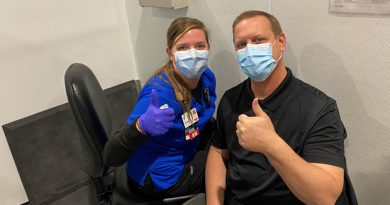COVID-19 Coronavirus: What You Should Know and What You Should Do
We are living in a very uncertain time. Spanish Influenza, HIV/AIDS, Cholera break-outs and other Flu Pandemics have caused stress in the past for many segments of our world. But rarely have we experienced anything like the current COVID-19 coronavirus in our lifetime.
Beyond the actual virus itself, one of the biggest problems we face today with COVID-19 may be the over-abundance of information regarding this disease. We live in a world of 24-hour news cycles, social media and other forms of instantaneous worldwide communications. This has caused rumors and misunderstandings to abound.
What we are attempting to do here is dispel rumors and give you resources where you can get the most current information regarding how we can understand what is happening in the world around us, specifically in NE Kansas.
What is the COVID-19 coronavirus?
Coronaviruses are common in people and animals. There are many different kinds. Some of them can cause colds or other mild respiratory (nose, throat, lung) illnesses. Other coronaviruses can cause more serious disease, including Severe Acute Respiratory Syndrome (SARS), Middle East Respiratory Syndrome (MERS) and the COVID-19 (COronaVIrusDisease2019) we are dealing with currently.
COVID-19 is a coronavirus that emerged in China in late 2019. It is a respiratory illness with symptoms like cough, fever and difficulty breathing. More severe cases can lead to severe respiratory problems, pneumonia, kidney failure and even death.
As of April 18, Shawnee County has 90 confirmed cases of COVID-19 resulting in 5 deaths; 42 have recovered and 43 are still active cases. There have also been 1610 people whose tests were negative with 117 people currently being monitored.
Am I At Risk?
While all people are at risk of contracting COVID-19, like any other flu or flu-like virus, you are especially susceptible if you have – or have been in contact with people who have – traveled to China, South Korea, Italy, Iran and other places where the virus has taken a foothold, including areas here in the United States.
The Kansas Department of Health and Environment (KDHE) has recommended that those persons who have traveled to the states of California, Florida, New York, Washington (on or after March 15); Illinois, New Jersey (on or after March 23); and Louisiana and Colorado (on or after March 27), be quarantined for 14 days after returning home.
Based on currently available information and clinical expertise, older adults and people of any age who have serious underlying medical conditions might be at higher risk for severe illness from COVID-19.
Those at high-risk for severe illness from COVID-19 include:
- People aged 65 years and older
- People who live in a nursing home or long-term care facility
- Other high-risk conditions could include:
- People with chronic lung disease or moderate to severe asthma
- People who have serious heart conditions
- People who are immunocompromised
Many conditions can cause a person to be immunocompromised, including cancer treatment, smoking, bone marrow or organ transplantation, immune deficiencies, poorly controlled HIV or AIDS, and prolonged use of corticosteroids and other immune weakening medications.
What Are the Symptoms?
The main three symptoms to be aware of are: fever, coughing and shortness of breath. These symptoms may appear 2-14 days after exposure, based on the incubation period of MERS-CoV viruses. The CDC has provided a Coronavirus Self-Checker online (cdc.gov) as a guide to help you make medical care decisions. If you develop emergency warning signs for COVID-19 such as; trouble breathing, persistent pain or pressure in the chest, new confusion or inability to arouse, or bluish lips or face, seek medical attention immediately. (This list is not all-inclusive so consult your medical provider for any other symptoms that are severe or concerning.)
How Can I Protect Myself and My Family?
Currently there is no vaccine available for COVID-19, so it is up to each one of us to protect ourselves and those around us. The virus is thought to spread mainly from personal contact, between people in close contact (within 6 feet) with one another. Respiratory droplets produced when an infected person coughs or sneezes can land in the mouths or noses of people who are nearby or be inhaled into the lungs. It can also be spread when you touch surfaces previously touched by an infected person, and then put your hands to your face (which the average person does about 50 times per day).
The absolute best way to prevent contracting the disease is, of course, to avoid being exposed to the virus. Social distancing, staying 6 feet away from others, and sheltering at home are recommended and even now being ordered by our local and state governments.
Other steps we should be taking are common sense personal hygiene: wash your hands regularly and thoroughly for at least 20 seconds. (A side note: sing the “ABC’s” song or “Twinkle, Twinkle Little Star” while you are washing your or your children’s hands.) If soap and water are not available a hand sanitizer, with at least 60% alcohol, can be used. And, avoid touching your eyes, nose and mouth with unwashed hands. If you have to cough or sneeze cover your mouth with a tissue or use the inside of your elbow. Throw tissues away immediately and wash your hands again.
Around the house and office, clean AND disinfect surfaces that you frequently touch. This includes tables, doorknobs, light switches, countertops, handles, desks, phones, keyboards, toilets, faucets and sinks. Clean surfaces with soap and water prior to sanitizing. Household bleach mixed 5 tablespoons (1/3rd cup) per gallon of water or 4 teaspoons per quart make for a good option when specific disinfectants are unavailable.
Facemasks should be worn only if you are sick and around other people or if you are caring for someone who is sick. Facemasks can give a false sense of security in terms of prevention, and if worn improperly can actually be a detriment.
READ: Kujima Health celebrates Minority Health Awareness Month
Do Not Panic
The best tips are to use your common sense and do not panic. Stockpiling and hoarding supplies is unnecessary and may even be illegal in certain circumstances. You should only buy what your family needs for a week or two, to minimize trips to the store. Buying weeks or months of supplies in advance leads to shortages and makes it difficult for other families to take care of themselves. Consumer demand has been exceptionally high, especially for groceries, cleaning supplies, and healthcare products. Supply chains haven’t been disrupted, but stores need time to restock.
All the information in this article comes from the CDC, FEMA, NIH, Johns Hopkins Medicine, KDHE and the Shawnee County Health Department.
For more local information Shawnee County Emergency Management are operating an information center and rumor control task force. The center is open from 9:00 AM to 4:00 PM, seven days a week and can be reached at (785) 251-4848 by phone and Covid19info@snco.us by email.
By Darcy Childs | Topeka Health & Wellness Magazine
Go here to visit the Topeka Health and Wellness Facebook page for local event notices, news and local announcements. To help us spread the word, and to continue seeing our posts on your Facebook feed, “Like” the page and then like or share a story now and then, so that they will keep showing up in your feed.






Pingback: Tips from a Nurse on COVID-19 - Topeka Health and Wellness
Pingback: Stay at Home Order: What You Need to Know - Topeka Health and Wellness
Pingback: COVID-19: An Update on Treatments and Initiatives - Topeka Health and Wellness